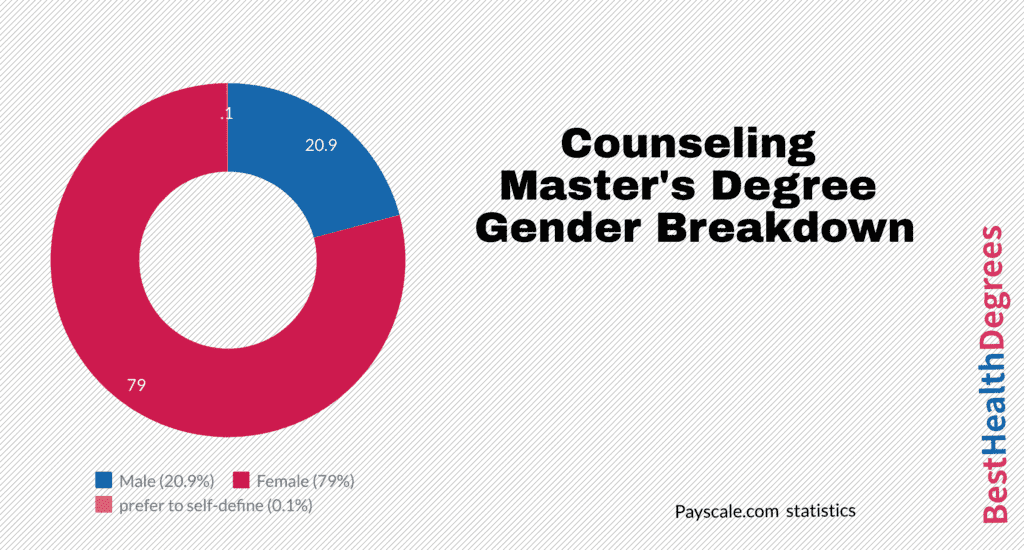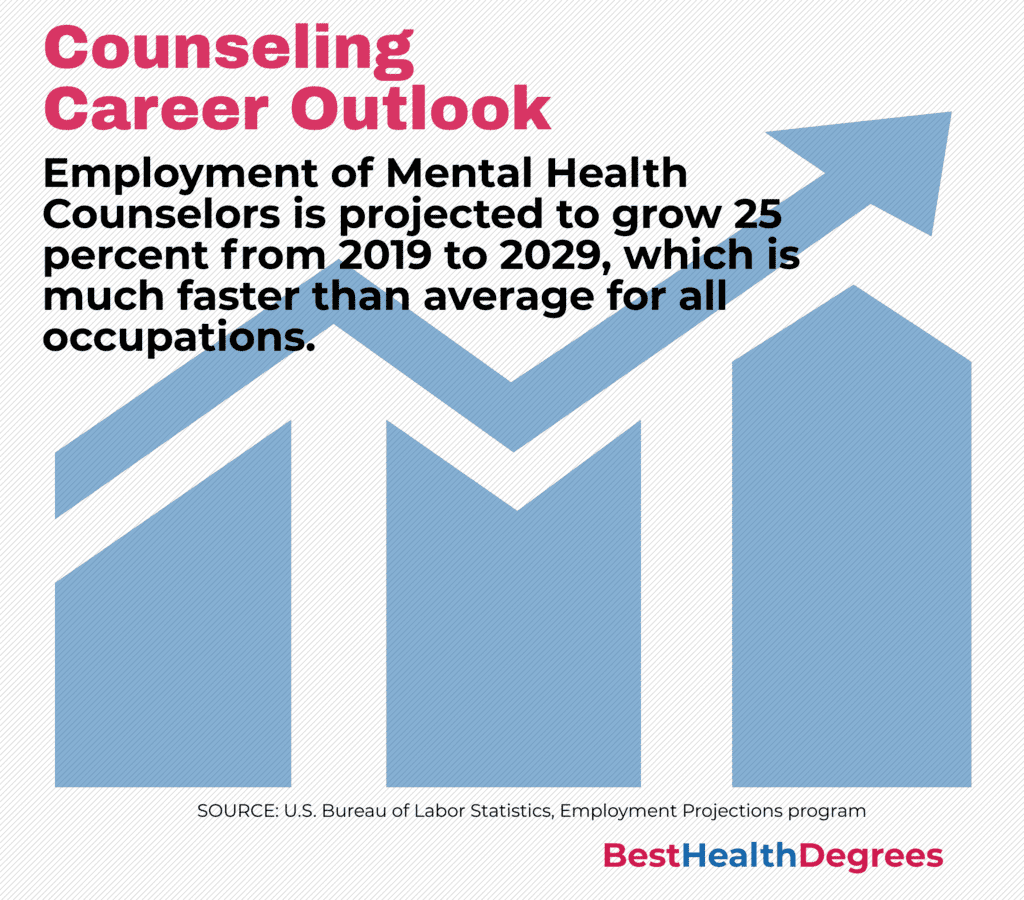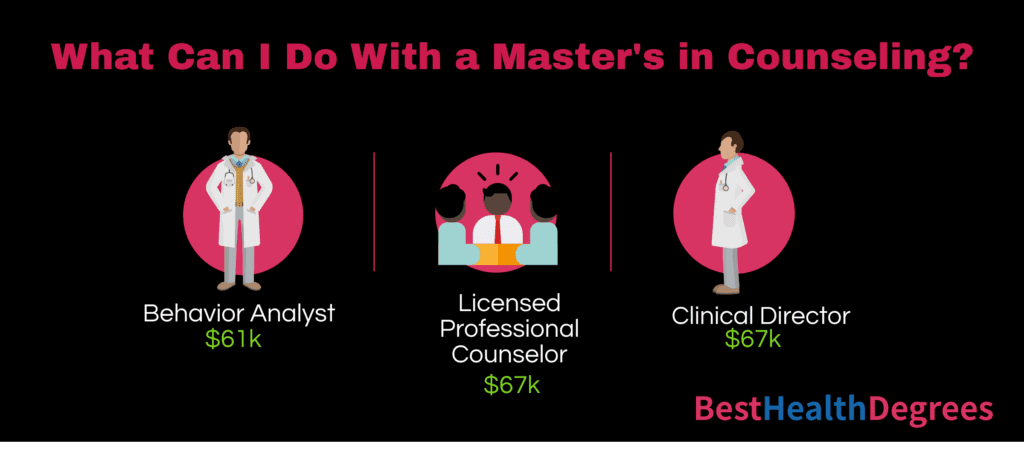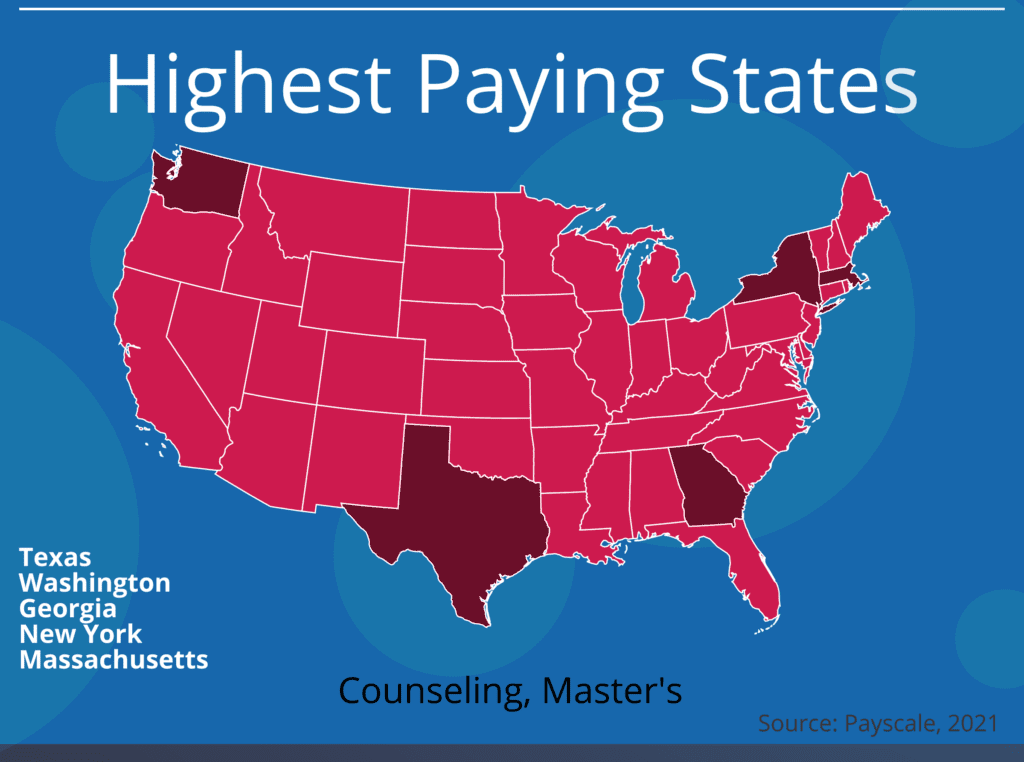Key Takeaways:
- A Master’s in Counseling opens up various career paths such as education, healthcare, private practice, and community agencies.
- The degree allows for specialization in areas such as mental health, school counseling, marriage and family therapy, and substance abuse counseling.
- Most counseling positions require state-specific licensing, which typically includes completing supervised clinical hours and passing a licensing exam.
- The demand for qualified counselors is growing due to an increased recognition of the importance of mental health services.
Counseling Degree Jobs you can get with a master’s include roles in clinical, hospital, school, and direct care in healthcare facilities and private practice. With the stress of a global pandemic, people all over America have been suffering from intensified mental and emotional strain. That’s why counseling is one of the best career choices for the right kind of person – emphatic, patient, and professional. With a master’s in counseling, students can qualify for an array of jobs not available to those with only a bachelor’s degree.
It’s important to understand what careers are available with a master’s in counseling program vs social work. Knowing the difference between a master’s in social work vs counseling can help students align their education with their preferred career path.
Master’s in Counseling vs MSW
Many potential students may debate whether a master’s in counseling or a master’s in social work is right for them. With a master’s in counseling, students can focus on clinical work and the core drivers of stress, discomfort, pain, and breakdowns involved in interpersonal relationships.
Many mental health counselors also choose a specialty in the mental health field to concentrate their practice working with a specific type of patient. It’s essential to gain the required knowledge to angle their education to their long-term career goals.
Main Populations
Four main areas where counselors experience significant patient populations include the following:
- Mental health
- Marital problems
- Addiction
- Family situations
When considering a master’s in social work vs counseling, college students should consider the clinical focus of counseling. Sometimes, counselors diagnose mental health conditions, including depression and anxiety, which is typically not within the realm of social work. Additionally, a mental health counselor offers mental health services.
It’s equally important to look at the other side of the coin when considering a master’s degree in counseling vs MSW.
Social workers also have specialized areas of focus and attempt to connect services with the people who need them. For example, many work in child and family services or provide substance abuse or family therapy. Sometimes, social workers try to initiate changes when the system proves oppressive to either communities or individuals.
Both counselors and social workers serve as advocates for the communities and individuals they serve. The decision to choose MSW vs masters in counseling may also arise from personal experiences the student has had.
Both Counselors and Social Workers find roles in private practices, educational settings, or for government agencies. Whichever path you choose offers a rewarding counseling career!
Why Get a Masters in Counseling?
Students who wish to help individuals overcome substance abuse, mental health struggles, marriage and family issues, and behavioral problems often choose a master’s in counseling over one in social work. For family counselors to master the knowledge needed to treat patients effectively, students need the in-depth courses available in a counseling master’s program.
When deciding between a master’s degree in counseling vs social work, students should know that social workers and family counselors often share work settings. Common work settings for a family counselor include the following:
- Hospitals
- Community agencies
- Private practice
Social workers often hold leadership positions in child protective services, welfare agencies, and advocacy groups. Those who want to make a change often seek influential positions in the administration of social services. This degree has helped professionals advocate for food stamp recipients, patients with mental health concerns, and underserved communities across the country.
Choosing between an MSW vs master’s degree in counseling often comes down to where the student wants to make the biggest impact. For example, MSW graduates often advance quickly through institutional hierarchies after receiving their degree and a few years of experience. This allows them to advocate for their clients.
Why Get a Master’s Degree in Counseling?
Counselors often want to work with individual clients over a period of time. For example, there are counselors who help kids deal with sexual and emotional abuse, physical abuse, and mental health disorders that arise as part of the process of growing up.
Marriage counseling is another concentration for those who obtain their master’s in counseling. This popular field choice makes it easier for students to own private practice or work with an organization that specializes in helping couples work through marital issues.
Accreditation for Counseling Programs
In this section will discuss regional accreditation for universities and colleges. We’ll also discuss specialized accreditations that apply specifically to programs that offer counseling degrees.
How important is CACREP accreditation? The Council for Accreditation of Counseling and Related Educational Programs offers accreditation for programs that meet CACREP’s academic and other standards.
- Is CACREP accreditation important for job applications in counseling? Besides specialized accreditations, such as CACREP, colleges and universities also go through regional accreditation through organizations that operate in their part of the country. These organizations grant accreditation to universities, colleges and schools to indicate whether they meet the organizations standards. The accreditation process represents the self-regulation of higher education providers.
The Council for Higher Education Accreditation (CHEA) evaluates the accrediting process used by regional accrediting agencies. CHEA has established a directory that helps students determine whether schools they are interested in have regional accreditation.
Is CACREP Accreditation Important?
CACREP accreditation is not essential but assure students that individual schools and universities meet the academic standards of the organization. It is also beneficial to students seeking counseling careers. Above all, students should choose programs that match their needs and goals.
Graduating from a CACREP program also fast tracks getting a National Certified Counselor (NCC) credential. CACREP graduates simply have to pass the exam with no other requirements.
CACREP accredits both master’s and doctorate programs offering counseling degrees.
What is CACREP Accreditation?
Colleges and universities that meet CACREP accreditation standards can claim CACREP accreditation status. The standards for this designation were last released in 2016. However, the organization plans to update its standards in 2023. In the United States, obtaining this accreditation is based on peer reviews. Schools and universities submit a self-study which is evaluated by counselor educators and counselors. The credential ensures a high-quality education.
CACREP accreditation standards refer to the accreditation of programs. The organization does not award certification to individuals. Accreditation indicates that training programs or college degrees meet certain requirements. Therefore, to become accredited, programs in counseling education must show that the program mission, institutional setting, and program objectives all comply with the high standards of CACREP reviewers.
Practicum experiences, faculty education and experience, the student selection process, and program governance all play a role in achieving this sought-after status. Certification refers to programs designated to individuals. In order to receive a certification, counselors would have to meet the educational and training standards of the appropriate certification board.
By following a code of ethics and engaging in ethical practices, counselors can earn and maintain a variety of certifications.
What is CACREP accreditation? When CACREP awards accreditation to programs, it looks at a variety of factors at the institutional level. This includes financial aid as well as the content of counseling degree courses. Once earned, it is not the college or department that maintains the accreditation status but the specific degree programs. In order to qualify for this accreditation, colleges and universities must also have their regional accreditation.
How important is CACREP accreditation? It’s a highly desirable designation and students should consider whether the school or university they wish to attend has this designation.
Types of Counseling Master’s Degrees
There are many types of master’s in counseling as well as counseling masters concentrations. This section will also explore the benefits of getting an online master’s in counseling.
Students can choose from dozens or hundreds of types of masters in counseling, not to mention all the various counseling masters concentrations available. Here, students can review the concentrations recognized by CACREP.
Whether students receive their masters in counseling online or in a brick-and-mortar university, they can get the same quality education, However, many students choose an online masters in counseling due to the convenience and flexibility of these programs.
Students who choose addiction counseling will work with individuals and families impacted by drugs, alcohol, and process addictions. These professionals may work in community agencies that offer counseling or in private practice.
Career counseling programs teach students to guide others in choosing a suitable career. These counselors may work in private or public organizations, career resource centers, universities, schools or private practice.
clinical mental health counseling
With a degree in clinical mental health counseling, students can guide couples, families, and individuals through treatment for emotional or mental health disorders. Many of these individuals work in private practice, hospitals or mental health centers.
Clinical rehabilitation counseling
Clinical rehabilitation counseling involves working with those who have physical, cognitive sensory, or psychiatric disabilities. The work settings for clinical rehabilitation counselors include private practice, hospitals, mental health facilities, substance treatment facilities and schools.
marriage and family counseling
Some students choose to focus on marriage and family counseling. In this role, they can serve individuals, families, and couples having issues within the family system. These counselors work in inpatient facilities, private practice, mental health facilities, and social service agencies.
rehabilitation counselor
- As a rehabilitation counselor, graduates work with disabled individuals attempting to reach occupational, psychological or other goals. These professionals work in a variety of settings that include rehabilitation facilities, schools, hospitals, universities, and government agencies.
School Counseling
- School counseling is another popular type of counseling degree. Students who focus their coursework on counseling young children may end up as school counselors for students in pre-K through high school. Both private and public schools hire school counselors.
student affairs and college counseling
- Another interesting counseling degree involves student affairs and college counseling. These professionals are typically hired by colleges and universities to serve their student populations. They may assist with the administration of counseling offices, student affairs offices, and housing and residential life to enrich the student experience.
Benefits of a Master’s in Counseling Online
With an online master’s in counseling, students can pursue their degree while working or taking care of their families. A master’s in counseling online often involves taking courses by the same faculty that teach in-class programs. There are many benefits to pursuing an online counseling degree.
Added Flexibility
Many people can’t afford to leave their full-time careers to go back to school. Therefore, online programs offer a lifeline for those who need to juggle busy lives and desire to further their education. The extreme flexibility of these programs gives students the opportunity to complete their work when and where it’s convenient.
Graduates with an online master’s degree don’t have to compromise their work schedule to commute to a nearby campus. Instead, they can attend any school in the country via their laptop or mobile device.
New Technical Skills
More and more jobs offer the opportunity to work remotely part or all of the time. In order to effectively work at home, students must master many technical skills. It’s also a plus for any job seeker to be familiar with tools such as Zoom, Skype, and content management systems. Even the most reliable online courses will have their share of technical glitches. After obtaining an online degree, students emerge with decent troubleshooting skills when it comes to connectivity and remote working.
Develop Self-Motivation
Students who successfully complete their master’s degree online show their initiative and self-motivation. Completing a degree online requires significant time management and self-motivation skills. Balancing work, school, and life responsibilities show that students can multitask at a high level.
Certifications and Licensure
There are numerous certifications and licenses that can help students land a job in their specialization. On the whole, the most coveted certification in counseling is the National Certified Counselor (NCC) credential. This is the largest national certification available.
Students also need to obtain their licenses under the jurisdiction of their state licensing board. Typically, this will involve passing a test and filling out the required application forms.
There are many jobs with a master’s in counseling that allow graduates to pursue their goal of helping others. Jobs with a master’s in counseling include lucrative salaries in leadership positions.
Students who want to maximize their earning potential in jobs with a master’s in counseling should seek the necessary certifications and licenses as soon as possible. Masters in Counseling jobs are highly competitive, and students should ensure that their resume and work experience match those required for the position.
What can I do with a master’s in counseling? In the next section, we list more jobs with counseling masters as well as the salaries that go with them. Masters of counseling jobs often start out with modest pay. While graduates might not grow rich on jobs you can get with a master’s in counseling, they can usually make a decent living.
What jobs can I get with a master’s in counseling? Keep reading to find out.
Salary Expectations with a Master’s in Counseling
The master’s in counseling salary range There is depending on where you live, the type of degree you have, where you went to school, any experience that you have in the field. A counseling salary with master’s degree enables students to pursue their specialization.
To maximum their master’s degree in counseling salary, students should be willing to move to where the most lucrative jobs are.
Careers in Counseling with a Master’s Degree
The salaries below of select counseling careers are based on current listings on Indeed.com. Jobs with a master’s in counseling have a national average salary of $32,785 per year according to Indeed. counselors guide and support those with emotional, psychological, or mental challenges. This involves creating individual treatment plans that help clients develop coping strategies.
community health workers
Jobs with counseling masters include community health workers, who average $31,181 per year. These professionals offer medical and health care to members of their local communities. They also connect individuals with the services that can assist them.
Residential Counselor
What can I do with a master’s in counseling? Jobs you can get with a master’s in counseling include many diverse opportunities including working as a residential counselor for an average salary of $39,506 per year. Residential counselors help individuals in group homes or shelters achieve independence with the help of community resources.
Career Counselor
What jobs can I get with a master’s in counseling? A master’s in counseling salary could include a job as a career counselor making an average of $45,594 per year. As a career counselor, graduates help individuals choose new career paths for a more fulfilling life or higher earning potential. Career counselors also help students choose the major that best meets their interests.
substance abuse counselors
A counseling salary with master’s degree focusing on chemical dependency averages $47,078 per year. In this role, graduates become counselors for patients with substance use disorders. They may work in private practice or as part of a rehabilitative facility. Substance abuse counselors also treat other behavioral disorders like gambling and eating disorders
Social Worker
Social workers make one of the highest master of counseling jobs salaries at $56,683 per year. These professionals help people at different stages of life overcome emotional or mental disorders that make it difficult for them to face the challenges of everyday life. A Licensed Clinical Social Worker (LCSW) is trained in clinical settings.
Family Therapist
Family therapists command a lucrative salary of $67,596. These professionals help families or couples face psychological and mental health issues experienced by loved ones. It helps families improve communication and resolve conflicts in productive ways. Professionals in marital and family therapy focus on the needs of the family or couple as a unit rather than as individuals.
Psychologist or mental health counselor
Masters of counseling jobs as psychologists can command one of the highest salary ranges, averaging $94,242 per year, according to Indeed.com. Psychologists are mental health counselors. They interview clients to assess their mental state and help clients reach a high level of awareness about the causes of their emotional, psychological and behavioral challenges.
Other Counseling Jobs
As students can see, salary ranges in the counseling field vary greatly depending on the area of concentration chosen. Therefore, students can tailor their career decisions accordingly.
Other masters in counseling jobs include:
- Substance abuse counselor: $46,067
- Health educator: $46,281
- Academic counselor: $49,873
- School counselor: $52,911
- Clinical therapist: $53,550
According to salary.com, a master’s degree in counseling’s salary average is around $50,000 in the United States. Most jobs in the field range between $46,000 and $54,000.
Because salary ranges vary widely, students need to maximize their educational credentials, certifications, and skills that make them desirable to employers.
A master’s in counseling salary isn’t the only consideration for graduates choosing their career goals. however, it’s important to understand what counseling salary with masters graduates can expect to receive. Additionally, master’s degree in counseling salary ranges varies from modest incomes to over six-figure salaries.
Students with a baccalaureate degree can also use this information to inform their decisions prior to choosing a concentration in Graduate School.
Why Join Professional Organizations?
There are many benefits to exploring professional organizations in counseling in general or in a student’s area of concentration. For one thing, these organizations often offer educational opportunities that students might not get elsewhere. This includes certifications, training, and exposure to essential skills required to succeed in the industry.
Associations often play a huge role in developing standards and practices in the industry. There are often tangible benefits such as salary increases upon obtaining certain certifications.
Graduates can also join professional organizations for networking opportunities. Many professional associations have student memberships to allow students to form mentorships before graduating. Some professional organizations offer student scholarship opportunities, making paying discounted student rates highly lucrative or joining organizations for free. Instead of operating in a silo, professionals can form standards of care that make their practices more productive and impactful.
Some students even make connections that help them find job leads or insight into how to succeed in the competitive marketplace.
There are numerous financial benefits to belonging to professional organizations. Some of them are direct financial benefits. For example, as members of some organizations, students can receive discounts on numerous products and conferences.
Many organizations also have magazines and journals with insightful content that doesn’t cost members anything over and above their subscription fees. In truth, many professional organizations discount their journals and magazines or distribute them for free.
Top Professional Organizations for Counselors
After learning about the salary ranges and job responsibilities of careers requiring a master’s in counseling, students can make a more informed decision on what school they would like to attend, whether they want to study online or in person, and what salaries they can expect after earning their degrees.
Some of the top professional organizations for counselors include:
- The American Counseling Association (ACA)
- National Board for Certified Counselors (NBCC)
- Council for Accreditation of Counseling and Related Educational Programs (CACREP)
- American Mental Health Counselors Association (AMHCA)
- American School Counselors Association (ASCA)
We’ve already talked about the importance of the National Board For Certified Counselors, responsible for managing the NCC certification, and the Council for Accreditation of Counseling Related Educational Programs, which accredits programs that offer counseling degrees. Exploring professional organizations that concentrate on a student’s chosen specialty is a good idea.
Related Rankings:
- 25 Best Counseling Master’s Programs
- 15 Best Online Counseling Master’s Programs
- 10 Fastest Online Counseling Master’s Programs
- What Can You Do With a Healthcare Management Degree?
- Best Types of Degrees for Counselors
- Best Online Psychology Bachelor’s Programs
- Most Affordable Online Psychology Bachelor’s Degree Programs
- Best Medical Billing and Coding Degrees
- Best Online Counseling Master’s Programs
- 15 Best Online Psychology Master’s Programs
- Best Public Health Bachelor’s Degrees



